It looks like you're using an Ad Blocker.
Please white-list or disable AboveTopSecret.com in your ad-blocking tool.
Thank you.
Some features of ATS will be disabled while you continue to use an ad-blocker.
share:
Originally posted by bigfatfurrytexan
reply to post by ajmusicmedia
This is correct. The fall of the Roman empire, followed by a series of climate disasters and disease pandemics, were what kept Europe "in the dark". Africa continued to thrive, free of the majority of the cold that Europe was faced with.
The fall of Rome had many reasons including corruption,but in the end it was book banning religious zealots thanks to a group of Irish Monks who saved and transcribed many works that along with knowladge gained from the Moors jumped started the European renaissance,I recommend the book How the Irish Saved Civilization.
edit on 18-2-2013 by Spider879 because: (no reason given)
reply to post by Spider879
You mentioned in a general way that the presence of a Moor on a coat-of-arms doesn't have to mean the founder of the family was one. Actually, I doubt it ever meant that. The most common reason for the use of a Moor's head on a European coat of arms is that a member of the family so honoured won a victory over the Moors during the Crusades. See here.
Also, the origins of the names Black, Moore and their derivatives (Moor is not a common surname, and I have never in my life heard of Moorison—plenty of Morrisons, though) are, for the most part, nothing to do with Moorish ancestry. The first meaning of 'moor' is an open heath, and people from villages near such places in England often had names so derived. People with the surname Black could likewise have come by it in a number of ways—hair colour or swarthiness of skin, a bad reputation, and so on. See the embedded links for more information.
None of this is to detract from the contribution of people of darker complexion to Western civilisation, neither is it to deny that plenty of eminent European and Anglo-Saxon families have what was once derisively known as 'a touch of the tar brush'. However, one should get one's facts right before one begins to speculate.
Actually I made it a pont to say in my opening post that all Moors on coat of arms are not founders of that family that some were on there due to fighting Moors rather than having babies with them,but one have to consider the name Moor, Moorison, Black, Blackman, Blackson...
You mentioned in a general way that the presence of a Moor on a coat-of-arms doesn't have to mean the founder of the family was one. Actually, I doubt it ever meant that. The most common reason for the use of a Moor's head on a European coat of arms is that a member of the family so honoured won a victory over the Moors during the Crusades. See here.
Also, the origins of the names Black, Moore and their derivatives (Moor is not a common surname, and I have never in my life heard of Moorison—plenty of Morrisons, though) are, for the most part, nothing to do with Moorish ancestry. The first meaning of 'moor' is an open heath, and people from villages near such places in England often had names so derived. People with the surname Black could likewise have come by it in a number of ways—hair colour or swarthiness of skin, a bad reputation, and so on. See the embedded links for more information.
None of this is to detract from the contribution of people of darker complexion to Western civilisation, neither is it to deny that plenty of eminent European and Anglo-Saxon families have what was once derisively known as 'a touch of the tar brush'. However, one should get one's facts right before one begins to speculate.
edit on 18/2/13 by Astyanax because: of recently acquired knowledge.
Originally posted by Astyanax
reply to post by Spider879
Actually I made it a pont to say in my opening post that all Moors on coat of arms are not founders of that family that some were on there due to fighting Moors rather than having babies with them,but one have to consider the name Moor, Moorison, Black, Blackman, Blackson...
You mentioned in a general way that the presence of a Moor on a coat-of-arms doesn't have to mean the founder of the family was one. Actually, I doubt it ever meant that. The most common reason for the use of a Moor's head on a European coat of arms is that a member of the family so honoured won a victory over the Moors during the Crusades. See here.
Also, the origins of the names Black, Moore and their derivatives (Moor is not a common surname, and I have never in my life heard of Moorison—plenty of Morrisons, though) are, for the most part, nothing to do with Moorish ancestry. The first meaning of 'moor' is an open heath, and people from villages near such places in England often had names so derived. People with the surname Black could likewise have come by it in a number of ways—hair colour or swarthiness of skin, a bad reputation, and so on. See the embedded links for more information.
None of this is to detract from the contribution of people of darker complexion to Western civilisation, neither is it to deny that plenty of eminent European and Anglo-Saxon families have what was once derisively known as 'a touch of the tar brush'. However, one should get one's facts right before one begins to speculate.
edit on 18/2/13 by Astyanax because: of recently acquired knowledge.
Thanks for the link I was just about to post on the Hohenstaufan dynasty's connections with the Moors coat of Arms and perhaps the inspiration for Shakespear's Othello,and I understand your point about how some names might have originated based on similarity of sounds but different in meaning that's why the Fairbairn's Book Of Crest link posted on the last post is a must see if one is to dive into the subject because it's not just the name or the image but a combination of both with additional back ground information of such families,and while David MacRitchie 's Ancient and Modern Britons Vols I & II,are a bit dated he gave incredible insight on the matter of possible dark non African aboriginal fossilized populations in Britain before and during the general movement of Tribes into the area from Germany.

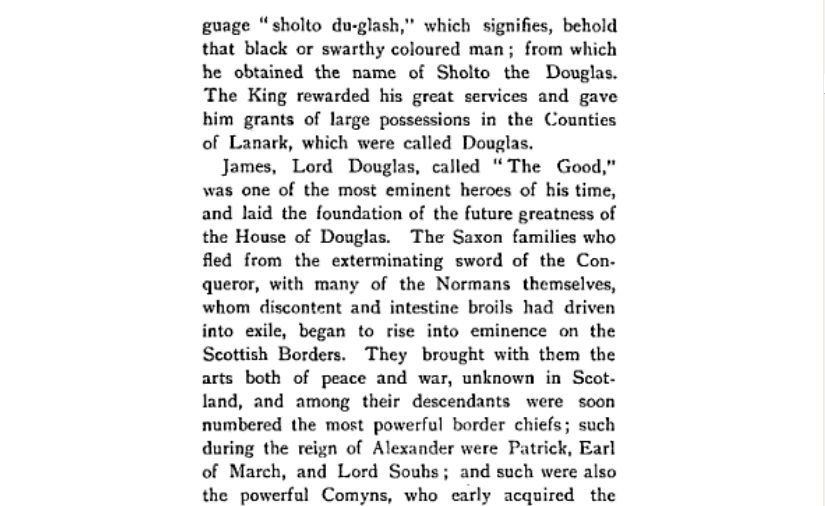
A screen shot of Ringrose's Heraldry
Page 68 incomplete e book. www.isbnlib.com...
Kenneth Douglas
The above is part of what I was referring to about possible Black non-African European aboriginals,
although the name Niger is curious,I am spectulating here, he may well be a decendant of Black troops stationed at
Hardrian's Walls By Septimius Servus.
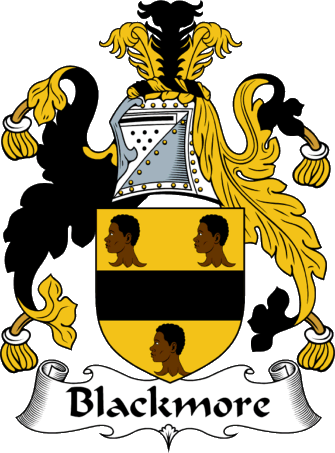
It is coat of arms like this I am reffering to about possible family founders with the family name Blackmoor and the like including the image.
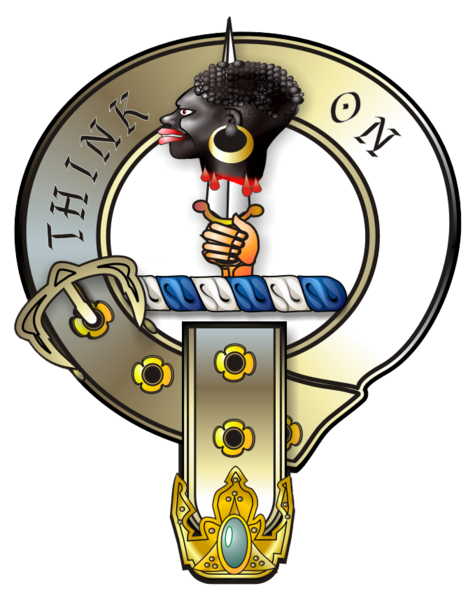
This one by TheMacLellan Family is graphic in it's depiction non the least tells a different story.
They did not play nice to the Moors.
en.wikipedia.org...
edit on 18-2-2013 by Spider879 because: (no reason given)
edit on 18-2-2013 by
Spider879 because: (no reason given)
Re. the Marquesses of Drogheda evidence. I have known and have read of many Irish people who were black and they never could figure out why, or how
this came to be. As far back as they could trace their roots they were simply just Irish and always had been. Years ago historians would just pass
them off as being stray Berbers. The Irish name Doyle literally means Black Stranger (Dubhghall - Dubh (black) Ghall (stranger) which is also found in
Scottish and Irish surnames MacDougall and MacDowell.
reply to post by Ramcheck
Not African-style black though, just black-haired and swarthy: the famous Black Irish.
Unless, of course, you mean Phil Lynott, who really was pretty dusky.
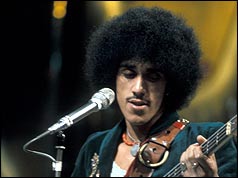
Yes, but mostly it meant Vikings or Normans.
I have known and have read of many Irish people who were black and they never could figure out why, or how this came to be. As far back as they could trace their roots they were simply just Irish and always had been.
Not African-style black though, just black-haired and swarthy: the famous Black Irish.
Black Irish' is often a description of people of Irish origin who had dark features, black hair, dark complexion and eyes.
Unless, of course, you mean Phil Lynott, who really was pretty dusky.

The Irish name Doyle literally means Black Stranger (Dubhghall - Dubh (black) Ghall (stranger) which is also found in Scottish and Irish surnames MacDougall and MacDowell.
Yes, but mostly it meant Vikings or Normans.
The Vikings were often referred to as the 'dark invaders' or 'black foreigners'. The Gaelic word for foreigner is 'gall' and for black (or dark) is 'dubh'. Many of the invaders families took Gaelic names that utilised these two descriptive words. The name Doyle is in Irish 'O'Dubhghaill' which literally means 'dark foreigner' which reveals their heritage as an invading force with dark intentions...
The traditional image of Vikings is of pale-skinned blond-haired invaders but their description as 'dark foreigners' may lead us to conclude that their memory in folklore does not just depend on their physical description. Source
Originally posted by Ramcheck
Re. the Marquesses of Drogheda evidence. I have known and have read of many Irish people who were black and they never could figure out why, or how this came to be. As far back as they could trace their roots they were simply just Irish and always had been. Years ago historians would just pass them off as being stray Berbers. The Irish name Doyle literally means Black Stranger (Dubhghall - Dubh (black) Ghall (stranger) which is also found in Scottish and Irish surnames MacDougall and MacDowell.
Some could very well have been archic dark/black Europeans serviving in relative small numbers later to be bred out by in-coming Anglo Saxon tribes,others were more than likely decendants of Moorish sea rovers,then again even earlier yet the Phoenicians a multi ethnic mix of typical Mid Eastern types and Africans were in England trading in Tin.
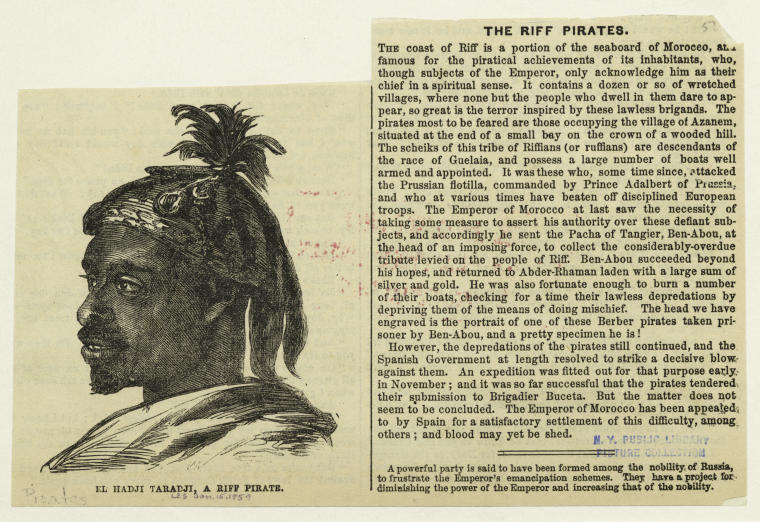
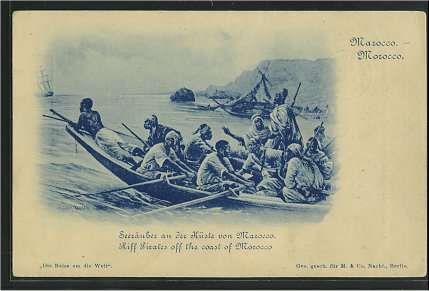
Men like these were much more than a nuisance to Mediterranean trade we have reports of them raiding the coastal lands of Britian kiddnapping villagers for sale in as late as the 1600red
Baltimore saga
A much stranger misfortune befell in 1631 when pirates from Algiers and armed troops of the Turkish Ottoman Empire stormed ashore at the little harbour village of Baltimore. In an era when it was common place for white traders from England to land on the African coast and to seize black people as slaves, this was one of the comparatively rare occasions when the boot was on the other foot.
A massacre took place when two Algerian galleys landed in the dead of night, sacked the town and bore off into slavery mostly women and children: altogether fifty youngsters ‘even those in the cradle’ were abducted, along with thirty-four women and nearly two dozen men, principally the descendants of dissenting and peaceful Protestant settlers from Cornwall, Somerset and Devon.
The invasion left King Charles I (reign 1625-49) incandescent with rage and provoked him into a reaction extreme enough to help create a revolution in England. Recognised at the time as an unprecedented act of aggression by the Islamist empire, Des Ekin’s recent book, The Stolen Village, is described as … a fascinating exploration of a forgotten chapter of British and European history.
divainternational.ch...
edit on 20-2-2013 by Spider879 because: (no reason given)
reply to post by Spider879
In Ireland? The Saxons did not gain a foothold in Ireland.
In England? The ancient Britons were Celts. Light-skinned fellers.
In Europe? Angles and Saxons were Teutonic tribes who overran Britain in the Dark Ages. The term Anglo-Saxon has no relevance to continental European history.
I don't mean to keep arguing with you, so I had better state my position. I am sympathetic to your subtext, which I interpret as a desire to show that people of colour, too, have made their contribution to world civilisation. I understand why it is important, emotionally and politically, to establish this, even though the facts are not really in question. Unfortunately they are not the same 'facts' you have put forward in this thread.
Here are the facts.
Some could very well have been archic dark/black Europeans serviving in relative small numbers later to be bred out by in-coming Anglo Saxon tribes
In Ireland? The Saxons did not gain a foothold in Ireland.
In England? The ancient Britons were Celts. Light-skinned fellers.
In Europe? Angles and Saxons were Teutonic tribes who overran Britain in the Dark Ages. The term Anglo-Saxon has no relevance to continental European history.
I don't mean to keep arguing with you, so I had better state my position. I am sympathetic to your subtext, which I interpret as a desire to show that people of colour, too, have made their contribution to world civilisation. I understand why it is important, emotionally and politically, to establish this, even though the facts are not really in question. Unfortunately they are not the same 'facts' you have put forward in this thread.
Here are the facts.
- If there was ever a time when dark-skinned tribes lived in Europe, that time is equally lost to history and to legend. Ancient myths of
ogres, dwarves, trolls and fairies may be imaginative references to European indigenes displaced by incoming pre-Celts and other Caucasian peoples,
but they do not particularly suggest that these people were dark-skinned. Maybe they were; maybe they weren't. Maybe they weren't even people.
- We cannot say for certain what colour were the skins of our African ancestors; if they were black, as seems not unlikely, then people of colour are
the inventors of tools, clothing, hunting, art, music, various forms of social organisation and above all language. They discovered fire—and
discovered the world too, when they set out on their wanderings. Their contribution to the progress of humanity is fundamental, revolutionary, awesome
and beyond doubt or challenge.
- In more recent times, however, Africans have not done so well. The great civilisation of Egypt (still, in terms of longevity, the most successful
in history) bequeathed little of value to the ages—no great religious ideas, no philosophy, no science, no mathematics, no world-changing
inventions, not even a fund of good bedtime stories. It seems to have been obsessed by death, and its legacy to the world is a collection of gigantic
tombstones. Other African civilisations left even less behind—if they ever really existed.
(Yes, I've looked at your recent thread, but I'm afraid a civilisation is a bit more than just an organised state with a centre of government; you need high culture too, and there's absolutely no evidence of that south of the Sahara.)
- Today, everyone is a mongrel. Between fifty and a hundred thousand years of human migration and trade have ensured that human genes are thoroughly
mixed, and the maritime revolution of c.1500 scrambled them well and truly. If there were ever any 'pure' whites, blacks, etc., in the world,
they have long since died out. Race is dead, and claims based on it are nonsense.
- Certainly, many European families have African or 'Moorish' blood in their veins. The sources vary; in some cases the bastards of unacknowledged
liaisons across the seas found their way to their fathers' home countries and had descendants who assimilated. Such instances would have been
relatively few in number, however, and legitimate unions between whites and non-whites were even rarer. The main source of African genes in European
genomes would have been interbreeding between South Europeans and North Africans, which occurred in Classical antiquity (I'm sure you've heard the
story of Dido and Aeneas) and again during the time of Muslim dominion in the
Mediterranean. As you know, large parts of Spain, as well as Sicily and other parts of Europe, were under Moorish (the word is correct in this
context) rule during the Dark Ages.
Septimus Severus, whom you mentioned earlier, was a product of that European/North African admixture. He was most certainly not black; at most, he would have had a light-olive complexion similar to that of modern Spaniards or South Italians. On his father's side he was half Punic, half Libyan (both of these groups were of mixed European/North African extraction), while on his mother's side he was pure Roman. Here's a bust of him—not at all Negroid, as you can see.
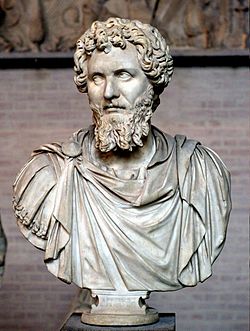
- By far the most important contribution dark-skinned Africans made to Western civilisation was the involuntary donation of their labour and their
culture. Yes, I mean slavery. Civilisation depends on economic surplus; the exploitation of black labour by whites produced such a surplus. Very
little of that surplus found its way back into their hands, of course. They did the work, and white folk enjoyed the fruits of their labour.
reply to post by Astyanax
Astyanax[
We are not arguing we are having a conversation,I do this over a bottle of Red Stripe or Guinness all the time but it wasn't me or any Afrocentrist who called him Black it was these folks below
New exhibition about Roman Emperor Septimius Severus at the Yorkshire Museum
www.yorkpress.co.uk...
And the references to his color and Africaness but especially that of his arch rival Pescennius Niger came from ancient text despite his looks the color portraiture of him on page showed him to be mildly dark about the color of Obama or ,the barbers have always been dark or lite skinned.

kinda like this guy^ perhaps Harold Ford, Jr. A self described black man (crook)..
penelope.uchicago.edu...
Astyanax[
We are not arguing we are having a conversation,I do this over a bottle of Red Stripe or Guinness all the time but it wasn't me or any Afrocentrist who called him Black it was these folks below
New exhibition about Roman Emperor Septimius Severus at the Yorkshire Museum
www.yorkpress.co.uk...
And the references to his color and Africaness but especially that of his arch rival Pescennius Niger came from ancient text despite his looks the color portraiture of him on page showed him to be mildly dark about the color of Obama or ,the barbers have always been dark or lite skinned.

kinda like this guy^ perhaps Harold Ford, Jr. A self described black man (crook)..
penelope.uchicago.edu...
edit on 20-2-2013 by Spider879 because: (no reason
given)
reply to post by Spider879
I don't think that article is very trustworthy—it's spinning the facts to suit modern fashions in political correctness and sell the exhibition it's promoting. I suppose you are aware that Yorkshire has a very large non-white population.
I've done a little exploring on the internet and I see a large number of web pages asserting that Septimius was black. However, no ancient source states that he was dark-skinned, so all such claims are purely speculative. The facts of his ancestry are as I have stated them. The idea that a black man could become Emperor of Rome without at least one commentator remarking on the colour of his skin is far-fetched, to say the least.
I don't think that article is very trustworthy—it's spinning the facts to suit modern fashions in political correctness and sell the exhibition it's promoting. I suppose you are aware that Yorkshire has a very large non-white population.
I've done a little exploring on the internet and I see a large number of web pages asserting that Septimius was black. However, no ancient source states that he was dark-skinned, so all such claims are purely speculative. The facts of his ancestry are as I have stated them. The idea that a black man could become Emperor of Rome without at least one commentator remarking on the colour of his skin is far-fetched, to say the least.
edit on 20/2/13 by Astyanax because: of ego (in Latin).
reply to post by Ramcheck
The term "black Irish" has nothing to do with black people. In some parts of Ireland the Irish have jet black hair, thick eyebrows and are short but well built. In other parts they have light hair, thin eyebrows and are generally speaking taller. Irish with dark features are referred to as black Irish due to their dark hair/eyes.
lifeandluxury.hubpages.com...
The term "black Irish" has nothing to do with black people. In some parts of Ireland the Irish have jet black hair, thick eyebrows and are short but well built. In other parts they have light hair, thin eyebrows and are generally speaking taller. Irish with dark features are referred to as black Irish due to their dark hair/eyes.
lifeandluxury.hubpages.com...
edit on 20-2-2013 by LUXUS because: (no reason given)
Originally posted by Spider879
reply to post by Astyanax
Astyanax[
We are not arguing we are having a conversation,I do this over a bottle of Red Stripe or Guinness all the time but
Who exactly would want to sit down with you and listen to a BS lecture about how your people built the pyramids and are responsible for civilizing Europeans....oh I forgot, maybe another afrocentric.
really cool thread and a lot to digest here so i may get more involved as things develop, SnF well deserved
a few things leapt out at me, firstly the sirname Morrison - now i speak a little scots gaelic and have various books on it lying around, and it's gaelic (ie:non anglicised) form is commonly Moireasdan. initially i thought that this would exclude it from your theory so i did a bit of digging and found info for both sides of the arguement - though this is the net ofc and misinfo spreads like wildfire... in my half hour or so reading i didnt get to the bottom of it, though found this on the clan morrison (aus) site that provides an interesting counter argument ..
www.clanmorrison.com.au...
also re the "black irish" thang mentioned earlier, phil lynott was born in england to a father who was in part ethnically african
en.wikipedia.org...
though it is worth noting that many historians (no refs, sorry) have suggested that ancient native brits (ie: post ice, pre celts) were dark haired and swarthy skinned... i have also known quite a few welsh folk of native descent with similar dark colouring - perhaps a trace of this mesolithic and neolithic descent.
moors also make it into European medieval literature, and not always as pure villains - in "The Song of Roland" the eponymous hero battles a force of moors - it's been a heck of a long time since i read it but i think that the moorish leader is portrayed as knightly and honourable??
en.wikipedia.org...
Wolfram Von Eschenbach's reknowned Parzival has the hero's knightly Moorish half brother Feirefiz who is portrayed as eventually becoming Prester John's father
en.wikipedia.org...
again, awesome thread
a few things leapt out at me, firstly the sirname Morrison - now i speak a little scots gaelic and have various books on it lying around, and it's gaelic (ie:non anglicised) form is commonly Moireasdan. initially i thought that this would exclude it from your theory so i did a bit of digging and found info for both sides of the arguement - though this is the net ofc and misinfo spreads like wildfire... in my half hour or so reading i didnt get to the bottom of it, though found this on the clan morrison (aus) site that provides an interesting counter argument ..
www.clanmorrison.com.au...
also re the "black irish" thang mentioned earlier, phil lynott was born in england to a father who was in part ethnically african
Lynott was born in Hallam Hospital (now Sandwell General Hospital) in West Bromwich (then in Staffordshire), England, and christened at St. Edwards Church in Selly Park, Birmingham. His mother, Philomena (or Phyllis) Lynott (b. 22 October 1930), is Irish, and his father was Cecil Parris, an Afro-Guyanese.[2][3] Some news and fan-site sources said that he was an Afro-Brazilian,[4][5] but in an August 2009 interview Parris's wife said that he was from Georgetown, British Guiana.[6] This was confirmed by Philomena Lynott in July 2010
en.wikipedia.org...
though it is worth noting that many historians (no refs, sorry) have suggested that ancient native brits (ie: post ice, pre celts) were dark haired and swarthy skinned... i have also known quite a few welsh folk of native descent with similar dark colouring - perhaps a trace of this mesolithic and neolithic descent.
moors also make it into European medieval literature, and not always as pure villains - in "The Song of Roland" the eponymous hero battles a force of moors - it's been a heck of a long time since i read it but i think that the moorish leader is portrayed as knightly and honourable??
en.wikipedia.org...
Wolfram Von Eschenbach's reknowned Parzival has the hero's knightly Moorish half brother Feirefiz who is portrayed as eventually becoming Prester John's father
Feirefiz represents Wolfram's belief that the Saracens were not wicked or even responsible for their lack of belief in Christ, an attitude that was not common in medieval Europe. Wolfram's cosmology included the non-believers as brothers who had not yet been reached by the word of Christianity
en.wikipedia.org...
again, awesome thread
edit on 20-2-2013 by skalla because: clarity, typos, the usual
edit on 20-2-2013 by skalla because: moar
tpyos
reply to post by Astyanax
a couple of point to consider..
ancient brits were around a heck of a long time before the celts reached our shores - the ice retreated (and humans followed obvs) around about 10k bce, and celts did not arrive here until the first millennium bce, so there is about nine thousand years of post ice age british history prior to the celts that can be considered.
also, no civilisations south of the sahara - you are not serious surely? what time period do you mean? not heard of Ile Ife? if i bothered to do some research i reckon i could find more
a couple of point to consider..
ancient brits were around a heck of a long time before the celts reached our shores - the ice retreated (and humans followed obvs) around about 10k bce, and celts did not arrive here until the first millennium bce, so there is about nine thousand years of post ice age british history prior to the celts that can be considered.
also, no civilisations south of the sahara - you are not serious surely? what time period do you mean? not heard of Ile Ife? if i bothered to do some research i reckon i could find more
Sorry...you don't need to be Afrocentric to acknowledge certain truths. Science and culture of the Greeks and Romans would have died out in Europe during the Middle Ages were it not preserved amongst the Moors.
Originally posted by LUXUS
Who exactly would want to sit down with you and listen to a BS lecture about how your people built the pyramids and are responsible for civilizing Europeans....oh I forgot, maybe another afrocentric.
Couple more observations from one whose name falls into this category (sorry...Canuck is a sobriquet, eh?). First off, there is a story that the Black Irish derive from Spanish sailors who swam ashore during the Spanish Armada.
Another story I heard about the source of this name-group centered around "The Cult of the Black Head"...some kind of medieval shenanigans involving a mummified head.
Carry on, though...interesting thread.
Originally posted by LUXUS
You know its easy to tell the race of a person by their skull so where are all these Black peoples skeletons, why arnt our archeologists finding them all over Europe...better still why are Europeans so white...did they refuse to mate with these moors? More importantly we have books going back that long in Ireland and UK, there is no reference of this.edit on 17-2-2013 by LUXUS because: (no reason given)
the skeletal remains of various races are found in archaeological excavations in europe, obviously the proportion in the uk lies much in favour of "white" to "non-white" (crappy terms) but as any reader of archaeology would know there are many many cases of non "traditionally indigenous" skeletons excavated.. part of the problem though is that skull shape is only a partial indicator of race and not terribly reliable, especially as human blood (and therefor race) is a lot more mixed up than the average person is aware of.
as to why are "europeans so white", where the heck have your eyes been? look all over europe and skin, eye and hair colour varies pretty wildly, go around the western mediterranean and things get pretty dusky pretty darn quick, but it seems you have chosen to ignore that. go to southern spain and take a look at the locals, it's very different to the uk for example.
and sorry to trample over your entire post, but as mentioned by a poster earlier, irish myth contains black characters, as does arthurian legend and the canterbury tales. if i had the time i would go through bede, the anglo saxon chronicle and adomnan of iona for the traces i believe are there. besides this it is a well known fact that many roman auxilliaries in britain were from north africa and intermarried with locals, had kids, and generally stayed after the romans had left.
ss
Originally posted by JohnnyCanuck
Sorry...you don't need to be Afrocentric to acknowledge certain truths. Science and culture of the Greeks and Romans would have died out in Europe during the Middle Ages were it not preserved amongst the Moors.
Firstly it is incorrect to say the Moors were Black people exclusively, we have several depictions in art showing the moors to be not black so I guess at most you could say some of the moors were black.
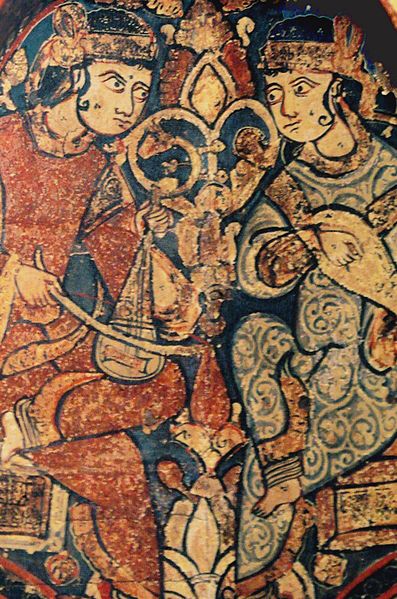
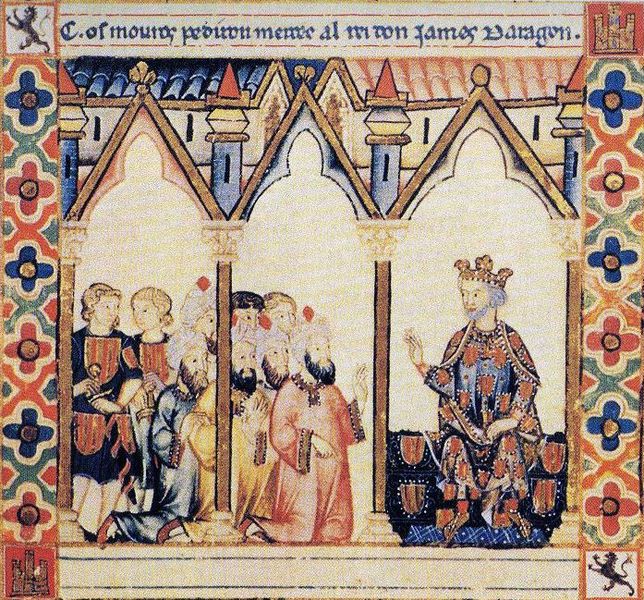
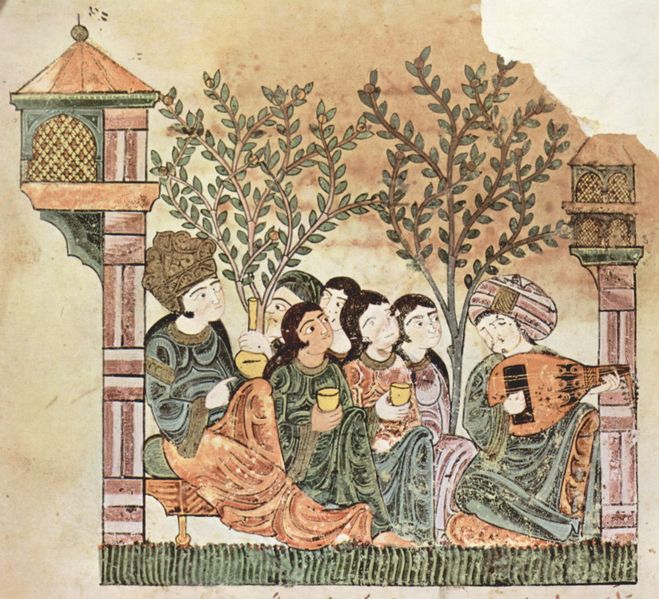
As for your assertion that science and culture would have died out were it not for the moors are you forgetting about the Arabs in general,the gnostic Christians or the Culdees ?
What Science are you talking about exactly anyway because according to my understanding the science of those days was magic, astrology and alchemy all of which was known and studied by natives of UK and Ireland...we would not regard any of those things as Science today.
edit on 20-2-2013 by
LUXUS because: (no reason given)
Yah...cuz we never talk about Archimedes, Euclid or Pythagoras today. Lord only knows, the Romans built their roads and bridges using magic.
Originally posted by LUXUS
What Science are you talking about exactly anyway because according to my understanding the science of those days was magic, astrology and alchemy all of which was known and studied by natives of UK and Ireland...we would not regard any of those things as Science today.
...and I didn't say Moors were all Black.
Originally posted by JohnnyCanuck
Yah...cuz we never talk about Archimedes, Euclid or Pythagoras today. Lord only knows, the Romans built their roads and bridges using magic.
Originally posted by LUXUS
What Science are you talking about exactly anyway because according to my understanding the science of those days was magic, astrology and alchemy all of which was known and studied by natives of UK and Ireland...we would not regard any of those things as Science today.
...and I didn't say Moors were all Black.
The British had roads well before the Romans invaded!
www.dailymail.co.uk...
As for Pythagoras and his mathematics it was a favorite subject among the early christian gnostic also the Templars were masters of geometry and architecture. I seriously doubt your assertion that such knowledge made its way to the UK via the moors. I fact I have in the past researched the Templars, masons, gnostics and alchemists and the moors are never mentioned in any text as a source of knowledge at least in the UK anyway
reply to post by LUXUS
it's really not news that celtic britain had roads - primarily hurdle built roads (ie: woven panels of hazel, alder or willow laid down in sequence) have been found and excavated in both ireland and mainland uk and extensively reported at least 40 years ago. after all, how would chariots have moved around the country so quickly to face the romans - narrow wheels and muddy ground are a bad mix. the ulster cycle of irish mythology also talks about them.
the report that you enclose is the first one i know of that references any cobbles in the construction, but it's long been accepted in both the archaeological/historical and classical lit reading communities that the roman roads were in many cases built over existing british wooden/pebble roads.
the romans did, however, greatly improve them via superior materials and construction.
it's really not news that celtic britain had roads - primarily hurdle built roads (ie: woven panels of hazel, alder or willow laid down in sequence) have been found and excavated in both ireland and mainland uk and extensively reported at least 40 years ago. after all, how would chariots have moved around the country so quickly to face the romans - narrow wheels and muddy ground are a bad mix. the ulster cycle of irish mythology also talks about them.
the report that you enclose is the first one i know of that references any cobbles in the construction, but it's long been accepted in both the archaeological/historical and classical lit reading communities that the roman roads were in many cases built over existing british wooden/pebble roads.
the romans did, however, greatly improve them via superior materials and construction.
edit on 20-2-2013 by skalla because: clarity
new topics
-
Awesome Dip Recipe
Food and Cooking: 17 minutes ago -
Vladimir Putin's speech at the meeting of the CSTO Collective Security Council
World War Three: 26 minutes ago -
Traveling the world with no passport
Social Issues and Civil Unrest: 5 hours ago -
Happy Thanksgiving to ATS
General Chit Chat: 8 hours ago
top topics
-
Simple Thanksgiving
Food and Cooking: 14 hours ago, 15 flags -
Happy Thanksgiving to ATS
General Chit Chat: 8 hours ago, 7 flags -
Traveling the world with no passport
Social Issues and Civil Unrest: 5 hours ago, 5 flags -
Vladimir Putin's speech at the meeting of the CSTO Collective Security Council
World War Three: 26 minutes ago, 0 flags -
Awesome Dip Recipe
Food and Cooking: 17 minutes ago, 0 flags
active topics
-
Vladimir Putin's speech at the meeting of the CSTO Collective Security Council
World War Three • 3 • : andy06shake -
Simple Thanksgiving
Food and Cooking • 31 • : Flyingclaydisk -
Mind Blowing Cave under someones land
Fragile Earth • 20 • : Astrocometus -
Awesome Dip Recipe
Food and Cooking • 0 • : Flyingclaydisk -
Happy Thanksgiving to ATS
General Chit Chat • 5 • : gort69 -
Inca stone masonry at Sacsayhuaman, Ollantaytambo and the Sun Temple
Ancient & Lost Civilizations • 21 • : Astrocometus -
A Mysterious Orb filmed over NYC by local news
Aliens and UFOs • 27 • : Lazy88 -
Traveling the world with no passport
Social Issues and Civil Unrest • 4 • : Popoll -
Petition Calling for General Election at 564,016 and rising Fast
Political Issues • 107 • : gortex -
I thought Trump was the existential threat?
World War Three • 116 • : andy06shake
